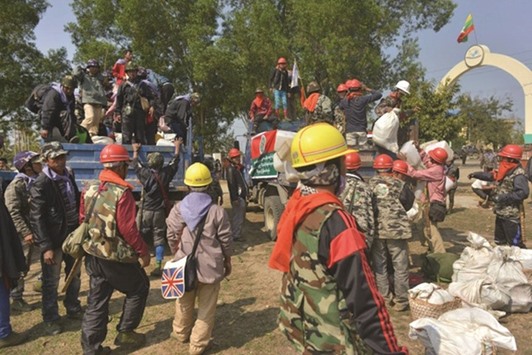State Chancellor Suu Kyi instructed government ministers to implement a ramped-up, 100-day plan at the start of May, according to U Zaw Htay, deputy director general of the President’s Office.
“Narcotics are a huge danger for our people, especially for youths,” Zaw Htay said.
Officials last month seized 21mn methamphetamine pills with a street value of around $35mn near the border with China.
It was the country’s second-largest haul, after authorities in July found an estimated 27mn tablets of methamphetamine valued at $106mn in an abandoned vehicle in Yangon.
Police said dozens of people had been detained, interrogated and charged, but none of those in charge of the scheme.
“The main drug traffickers for the big cases, I mean for these two record cases, are still not apprehended,” said a senior officer at police headquarters in Naypyidaw, who requested anonymity.
“We know who are masterminds of the drug trafficking, however, it is almost impossible to arrest them at the moment,” he said.
“They are well-connected businessmen. Some are protected by rebels and some have close relation to powerful army generals,” he said.“We believe the drugs what we seized are just a small portion of drug produced in the country,” he said.“It is disappointing and makes us shameful.”
Myanmar, the world’s second-largest heroin producer, has extended a 15-year drug eradication plan for another five years until 2019, but is still seeing rising production.
Suspects are mobile and elusive, and often protected by armed groups in rebel-controlled border areas, deputy home affairs minister Major General Aung Soe said.
“Without co-operation from ethnic rebels, we cannot have any success in the war on drugs,” he told parliament last month.
Myanmar has seen one of the world’s longest and most complex civil wars, as dozens of armed groups in diverse ethnic areas have been fighting the central government for greater autonomy since shortly after the country’s independence from British in 1948.
The illegal drug trade has flourished during the conflict, as both the army and rebels have used opium to finance themselves, said Yawd Serk, chairman of the Restoration Council of Shan State/Shan State Army, one of the largest rebel groups in Myanmar.
“In the early days, opium was the currency of the rebels,” Ywad Serk said by phone.“It now mostly goes to the military and militias allied with them.”
He said the army uses the drug trade to finance local militias that protect the military’s interest in the ethnic areas, especially in eastern Shan state and northern Kachin state.
“The ethnic rebels can no longer be solely blamed for drug trade,” he said.“Most of the poppy plantation areas are under control of local militias.”
Unlike the Border Guards, which are officially part of the army, the militia forces are not part of the military budget.
Their weapons, ammunition and rations are often financed through illicit trade.
That has fuelled the underground economy of drugs and natural resources, prominent Kachin activist Khun Ja said.
“Drugs, teak and guns are the main sources of income for militias in Kachin state,” she said.
Myanmar accounted for 20% of the world’s 218,000 hectares of poppy cultivation in 2016, with 55,500 hectares, according to the UN Office on Drugs and Crime.
It’s opium production was 650 tonnes, 14% of the global output of 4,770 tonnes, it said in its World Drug Report 2016.
Attempts by local activists to eradicate poppy crops have met with military resistance, they say.
About 3,000 members of the Christian anti-drug vigilante group called Pat Jasan faced a week-long standoff with police when they tried to destroy poppy fields controlled by the militias in Kachin state, and were finally attacked by unidentified gunmen.
The fields were allegedly owned by local strongman Zahkaung Ting Ying of the New Democratic Army-Kachin, which became a political party in 1999.
He won a seat in the upper house in the 2010 and 2015 elections.
But he was ordered by the elections committee in June to step down for violating polling regulations.
Pat Jasan was formed two years ago by the Kachin Baptist Convention and has campaigned to eradicate the poppy fields used to produce opium and heroin.
Khun Ja denied that local farmers were involved in poppy cultivation, saying they were too poor to afford the necessary heavy equipment.
“Only the militias and some Chinese businessmen can do that,” she said.“Poppy is the best and easiest business for them.”

